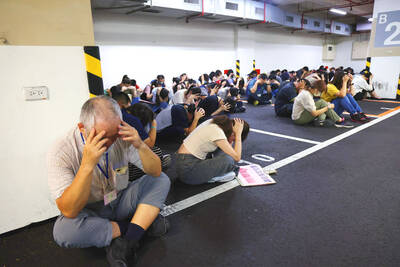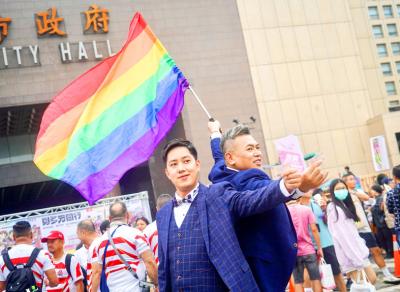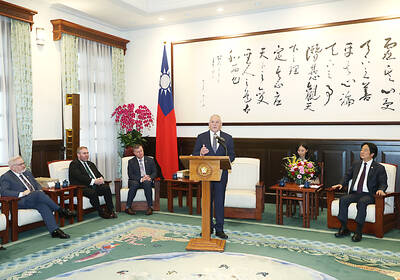Taiwan’s health authority on Thursday said it has plans to expand existing National Health Insurance (NHI) coverage to include three types of cancer immunotherapies, effective from June at the earliest.
The NHI coverage will include first-line treatments for non-squamous non-small cell lung cancer (NSCLC) and metastatic colorectal cancer, as well as the early stages of triple-negative breast cancer (TNBC), the National Health Insurance Administration (NHIA) said.
Roughly 2,700 to 3,400 patients are expected to immediately benefit from this new measure, with approximately NT$3.295 billion (US$101.28 million) to be allocated from a dedicated cancer fund each year to subsidize those cancer immunotherapies, according to NHIA.

Photo: CNA
Huang Yu-wen (黃育文), director of the administration’s Medical Review and Pharmaceutical Benefits Division, said cancer patients can expect to save about NT$1.71 million (US$52,564) to NT$2.47 million in medical expenses each year.
The biggest beneficiary would be NSCLC patients, of which there are 1,581 to 1,930 in Taiwan, followed by those with TNBC and metastatic colorectal cancer at 826-897 and 265-587, respectively, Huang said.
The goal is to introduce this new coverage plan in June, he added.
According to the NHIA, the decision was made to align with international treatment guidelines, citing the United States’ National Comprehensive Cancer Network (NCCN) as a reference.
Based on information from the NCCN, pembrolizumab and atezolizumab are two types of drugs that are being used to effectively treat NSCLC, it said.
The plan to include those three types of cancer immunotherapies into the NHI system which covers pembrolizumab and atezolizumab came after much discussion with various local medical communities and patient groups, the NHIA added.

Taipei on Thursday held urban resilience air raid drills, with residents in one of the exercises’ three “key verification zones” reporting little to no difference compared with previous years, despite government pledges of stricter enforcement. Formerly known as the Wanan exercise, the air raid drills, which concluded yesterday, are now part of the “Urban Resilience Exercise,” which also incorporates the Minan disaster prevention and rescue exercise. In Taipei, the designated key verification zones — where the government said more stringent measures would be enforced — were Songshan (松山), Zhongshan (中山) and Zhongzheng (中正) districts. Air raid sirens sounded at 1:30pm, signaling the

The number of people who reported a same-sex spouse on their income tax increased 1.5-fold from 2020 to 2023, while the overall proportion of taxpayers reporting a spouse decreased by 4.4 percent from 2014 to 2023, Ministry of Finance data showed yesterday. The number of people reporting a spouse on their income tax trended upward from 2014 to 2019, the Department of Statistics said. However, the number decreased in 2020 and 2021, likely due to a drop in marriages during the COVID-19 pandemic and the income of some households falling below the taxable threshold, it said. The number of spousal tax filings rebounded

A saleswoman, surnamed Chen (陳), earlier this month was handed an 18-month prison term for embezzling more than 2,000 pairs of shoes while working at a department store in Tainan. The Tainan District Court convicted Chen of embezzlement in a ruling on July 7, sentencing her to prison for illegally profiting NT$7.32 million (US$248,929) at the expense of her employer. Chen was also given the opportunity to reach a financial settlement, but she declined. Chen was responsible for the sales counter of Nike shoes at Tainan’s Shinkong Mitsukoshi Zhongshan branch, where she had been employed since October 2019. She had previously worked

‘NON-RED’: Taiwan and Ireland should work together to foster a values-driven, democratic economic system, leveraging their complementary industries, Lai said President William Lai (賴清德) yesterday expressed hopes for closer ties between Taiwan and Ireland, and that both countries could collaborate to create a values-driven, democracy-centered economic system. He made the remarks while meeting with an Irish cross-party parliamentary delegation visiting Taiwan. The delegation, led by John McGuinness, deputy speaker of the Irish house of representatives, known as the Dail, includes Irish lawmakers Malcolm Byrne, Barry Ward, Ken O’Flynn and Teresa Costello. McGuinness, who chairs the Ireland-Taiwan Parliamentary Friendship Association, is a friend of Taiwan, and under his leadership, the association’s influence has grown over the past few years, Lai said. Ireland is